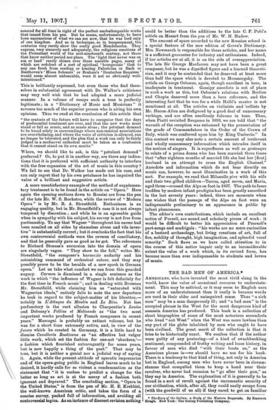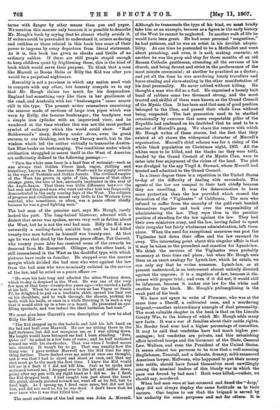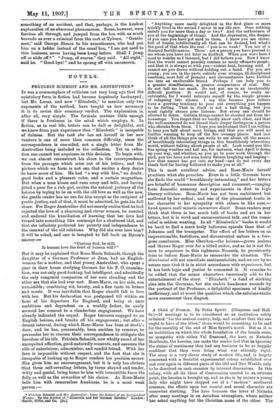THE BAD MEN OF AMERICA.*
AMERICANS, who have invented the most vivid sling in the world, know the value of occasional recourse to understate- ment. This may be satirical, or it may seem to English ears more of an understatement than it really is because words are used in their older and unimpaired sense. Thus " a sick man" may be a man dangerously ill; and "a bad man" is the accepted phrase in the West for the most dangerous kind of assassin America has produced. This book is a collection of short biographies of some of the most notorious scoundrels who lived " out West" when the West was more lawless than any part of the globe inhabited by men who ought to have been civilised. The great merit of the collection is that it tries to be historically exact. We confess that if the author were guilty of any posturing—of a kind of swashbuckling sentiment, compounded of frothy writing and loose history, in favour of men who died "with their boots on," as the American phrase is—we should have no use for his ; book. There is a tendency to that kind of thing, not only in America but in England, among men who have never been in circum- stances that compelled them to keep a band near their revolver, who never had occasion to "go after their gun," as they say in America. The explanation of it is generally to be found in a sort of revolt against the unromantic security of our civilisation, which, after all, they could easily escape from (with the goodwill of us all) if they cared to get on familiar • The Rory of thcOutialo: a Study of the Western Devorado. By Emerson Rough. NOT York: The Outing Publishing Company. terms with danger by other means than pen and paper. We mention this manner only because it is possible to describe Mr. Hough's book by saying that he almost wholly avoids it. If writers could be persuaded to understand it, crimes as cluing and ruthless as those related in this book lose some of their power to impress by every departure from literal statement. As it is, this book has given na shocks and thrills of no ordinary calibre. If there are still people stupid enough to keep children quiet by frightening them, this is the kind of book which would serve their purpose. To think that a man like Murrell or Boone Helm or Billy the Kid was after you would be a perpetual nightmare.
Rascality is not a province in which any nation need wish to compete with any other, but honesty compels us to say that Mr. Hough claims too much for his desperadoes. England had something very like them in her gentlemen of the road, and Australia with her " bushrangers " came nearer still to the type. The present writer remembers examining the armour made of sections of large iron pipes which was worn by Kelly, the famous bushranger; the headpiece was a simple iron cylinder with an improvised visor, and he wondered at the time whether this was not the most perfect symbol of outlawry which the world could show. "Rolf Boldrewood's" story, Robbery under Arms, owes its great success, to our thinking, not to any literary merit, but to the wisdom which led the author virtually to transcribe Austra- lian Blue-books on bushranging. The conditions under which, civilisation struggled to assert itself in the West of America are sufficiently defined in the following passage ;—
" Turn the white man loose in a land free of restraint—such as was always that Golden Fleece land, vague, shifting and transitory, known as the American West—and he simply reverts to the ways of Teutonic and Gothic forests. The civilized empire of the West has grown in spite of this, because of that other strauge germ, the love of law, anciently implanted in the soul of the Anglo-Saxon. That there was little difference between the bad man and the good man who went out after him was frequently demonstrated in the early roaring days of the West. The religion of progress and civilization meant very little to the Western town marshal, who sometimes, or often, was a peace officer chiefly because he was a good fighting man."
The bad man of the genuine sort, says Mr. Hough, rarely looked the part. The long-haired blusterer, adorned with a dialect that never was spoken, serves very well in fiction about the West, but he is not the real badman. Billy the Kid was outwardly a smiling-faced, amiable boy, and he had killed twenty-two men before he himself was twenty-one. At that age he was shot dead by the famous peace officer, Pat Garrett, who twenty years later has received some of the rewards he deserved from Mr. Roosevelt. 011inger, on the other hand, is still remembered in the West as the doubtful type with which pictures have made us familiar. He stepped over the narrow margin which divided the bad men who were against the law from the bad men who were nominally enlisted in the service of the.law, and he acted as a peace officer :— "He wore his hair long and affected the ultra-Western dress, which to-day is despised in the West. He was one of the very few men at that time—twenty-five years ago—who carried a knife at his belt. When he was in such a town as Las Vegas or Santa Fe, be delighted to put on a buckskin shirt, spread his hair out on his shoulders, and to walk through the streets, picking his teeth with his knife, or once in a while throwing it in such a way that it would stick up in a tree or a board. He presented an eye- filling spectacle, and was indeed the ideal imitation bad man."
We must give here Garrett's own description of how he shot Billy the Kid:—
"The Kid stepped up to the bedside and laid his left hand on the bed and bent over Maxwell. He saw me sitting there in the half darkness, but did not recognise me, as I was sitting down. My height would have betrayed me had I been standing. 'Pete, Quien es he asked in a low tone of voice; and he half motioned toward me with his six-shooter. That was when I looked across into eternity. It wasn't far to go. That was exactly how the- thing was. I gave neither Maxwell nor the Kid time for any- thing farther. There flashed over my mind at once one thought, and it was that I had to shoot and shoot at once, and that my shot must go to the mark the first time. I knew the Kid would kill me in a flash if I did not kill his.. Just as he spoke and motioned toward me, I dropped over to the left and rather down, going after my gun with my right band as I. did so. As I fired, the Kid dropped back. I bad caught him just about the heart. His pistol, already pointed toward me, went off as he fell, but he fired high. As I sprang up, I fired once more, but did not bit him, and did not need to, for he was dead. I don't know that he ever knew who it was that killed him."
The most ambitious of the bad men was John A. Merrell. Although he transcends the type of his kind, we must briefly take him as an example, because as a figure in the early history of the West he cannot be neglected, In another walk of life he would have been great. He had some personal " magnetism," he bad patience, and he was an artist in his devilish adapta- bility. At one time he pretended to be a Methodist and went about preaching, and even, it is said, making converts; at another he was the prop and stay for three months of an old. Roman Catholic gentleman, attending all the services of his church, and being devout and strict in the performance of the most minute ceremonial ; at another he practised as a doctor; and yet all the time he was murdering lonely travellers and horse-stealing and slave-stealing in the other manifestation of his dual personality. He never robbed without killing. He thought a man who did so a fool. He organised a loosely knit band of robbers some two thousand strong, and the most trusted and skilful of them were known as the Grand Council of the Mystic Clan. It has been said that men of good position belonged to the Clan, and passed their whole lives without being suspected. The last generation used to be startled occasionally by rumours that some respectable pillar of the Republic had confessed on his deathbed that he used to be a member of Marrell's gang. We share the reserve with which Mr. Hough writes of these stories, but the fact that they existed at all shows the widespread character of Mu yell's. organisation. Marren chief scheme was for a rising of the whole black population en Christmas night, 1835. All the whites were to be killed, and the blacks (so they were told), headed by the Grand Council of the Mystic Clan, were to enter into free enjoyment of the riches of the land. The plot was divulged by the spy Virgil A. Stewart, whom Murrell had trusted and admitted to the Grand Council.
In a lesser degree there is a repetition in the United States to-day of the difficulty of dealing with scoundrels. The agents of the law are unequal to their task chiefly because they are unwilling. It was the determination to have more protection than the law provided which caused the formation of the " Vigilantes" of California. The men who refused to suffer from the anarchy of the gold-rush banded themselves together and took over the responsibility of administering the law. They were thus in the peculiar position of standing for the law against the law. They had their own miniature army, and the law, having failed to upset their irregular but fairly wholesome administration, left them alone. When the need for exceptional measures was past the Vigilantes laid down their office and the law resumed its sway. The interesting point about this singular affair is that it may be taken as the precedent and sanction for Lynch-law. We think the services of the Vigilantes were probably necessary at their time and place; but when Mr. Hough uses them as an exact analogy for Lynch-law, which be extols, we can only say that he writes nonsense. Lynch-law, as at present understood, is an instrument almost entirely directed against the negroes ; it is a negation of law, because it dis- penses with proper trial ; and even if it did not, it would still be infamous, because it makes one law for the white and another for the black. Mr. Hough's philosophising is the weak part of his book.
We have not space to write of Plummer, who was at the same time a Sheriff, a cultivated man, and a murdering brigand,—another extraordinary example of dual personality. The most valuable chapter in the book is that on the Lincoln County War, to the history of which Mr. Hough adds many new facts. It was a war of families about their cattle rights. No Border feud ever had a higher percentage of casualties. It may be said that vendettas have bad much higher per. centages ; bat vendettas are private, and this astonishing affair involved troops and the Governor of the State, General Lew. Wallace, and even the President of the United States. It seems almost too perverse to be true that a well-meaning Englishman, Tunstall, and a delicate, dreamy, mild-mannered American lawyer, McSween, who happened to put their money into cattle, should have found themselves most unwillingly among the nominal leaders of this bloody war in which the pace was forced by bad men! Both were killed,—eather, we should say, murdered.
When bad men were at last cornered and faced the "drop,' they did not always display the same fortitude as in their careers. One begins to see that the brigand is served by his audacity for some purposes and not for others. It is
something of an accident, and that, perhaps, is the kindest explanation of an abnormal phenomenon. Some, however, were fearless all through, and jumped from the box with as much bravado as ever a criminal from the cart at Tyburn. "Gentle. men," said George Shears to his executioners, who had put him on a ladder instead of the usual box, "I am not used to this business, never having been hung before. Shall I jump off or slide off ?" "Jump, of course," they said. "All right," said.he. " Good-bye!" and he sprang off with unconcern.












































 Previous page
Previous page